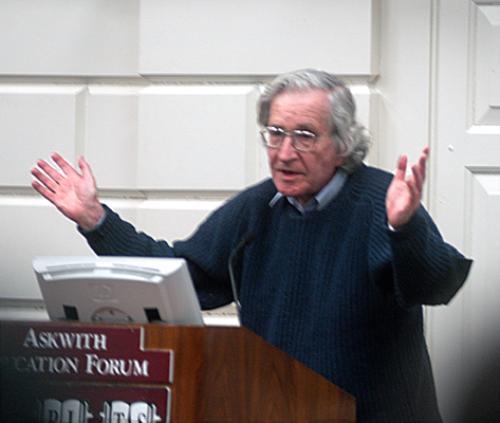
News
Cambridge Residents Slam Council Proposal to Delay Bike Lane Construction

News
‘Gender-Affirming Slay Fest’: Harvard College QSA Hosts Annual Queer Prom

News
‘Not Being Nerds’: Harvard Students Dance to Tinashe at Yardfest

News
Wrongful Death Trial Against CAMHS Employee Over 2015 Student Suicide To Begin Tuesday

News
Cornel West, Harvard Affiliates Call for University to Divest from ‘Israeli Apartheid’ at Rally
Chomsky, Activists Urge Alliances For Social Change

In front of a standing-room only crowd at the Graduate School of Education Friday, MIT Professor of Linguistics Noam Chomsky and fellow activists urged progressive groups to form alliances to bring about social change.
Chomsky was joined by Leonida Zurita Vargas, the leader of a women’s peasant movement in Bolivia; Carolina Contreras, a socially active Somerville High School sophomore; Mel King, a former Massachusetts state representative; and Lev Grossman-Spivack, a Boston University junior who creates activist lyrics and poetry, at the forum, entitled “Another World is Possible”.
The forum was set against the backdrop of the second World Social Forum (WSF), which took place last month in Porto Alegre, Brazil, and from which Chomsky recently returned.
The WSF is an international meeting scheduled concurrently with the World Economic Forum in Davos, Switzerland, in an attempt to provide an alternative for groups and individuals interested in what Chomsky described as “global justice, social futures and international immigration.”
Chomsky said efforts like the WSF bring together progressive groups from numerous countries. Such global efforts are important to the progressive cause, he said, lauding labor and peasants as two constituencies which have formed successful international movements.
“Peasant farmers are trying to preserve not only their way of life but trying to develop a sustainable system that meets the needs and cooperates with consumers,” Chomsky said.
A representative of such farmers, Vargas is secretary general of Bartolina Sisa, the National Federation of the Women’s Peasant Movement and president of the Six Federations of Coca Growers in Bolivia.
Wearing a traditional Bolivian hat, she told the audience through an interpreter of her childhood in Chapare, a poverty-stricken region she said is largely populated by coca farmers.
She said she received only a seventh grade education because a government intervention to allow coca farmers to switch to less internationally controversial crops failed, forcing her to return home in order to help her family survive.
Vargas pointed out what she viewed as the negative side effects of U.S. intervention in her country.
“I really want to think there’s another world possible,” she said. But because of free trade policies in the Americas, outside interests are stripping Bolivia of its natural resources.
People in her country “are living in a state of undeclared war” against the “neo-liberal, modern world,” Vargas said. “We are fighting for our natural resources—gas, water, oil—against the free trade of the American Agreement.”
She said her people are also unwilling participants in a hot war.
The U.S. has supported the Bolivian government in its violent campaign against coca growers because of its potential to be turned into cocaine, she said.
“Neo-liberalism has brought war, a war on drugs. Now it’s a war against terrorism. Still, the bullets are getting to us,” Vargas said. “We are fighting on two levels—for our land, the ‘mother of life’, and for coca leaf which is part of our culture, part of our heritage.”
But she argued that the coca leaf is not the same as cocaine.
“Peasants are not producing drugs; peasants are against drugs,” she said.
According to Vargas, the chemicals to convert the leaf into a controlled substance come from the U.S.
When asked what Americans could do to help, she said, “We should campaign in favor of Coca leaf—de-Satanize it. We should talk to our congressmen and tell them, ‘No more aid for alternative development.’”
Monetary aid sent by the American government in the past did not reach the poor Bolivians for whom it was intended, she said. Instead, “it was turned into machine guns and bullets, into casualties.”
According to Vargas, change is only possible through coalitions. “We have to fight for making alliances. We have to fight for the poor.”
Contreras, who is a co-chair of the Somerville High School branch of Atrevete, a Latino youth conference, said she strives to foster non-violence by teaching mediation to elementary school students.
She told the audience of her vision for a brighter future, one that she said she felt was achievable—but only if progressive groups work together.
“I used to believe that one person cannot make a big difference. I now know this is completely false,” she said. “By making alliances, by making coalitions, we can make a bigger impact and a change in this world.”
Still, she said, there is not enough attention paid to children. “We need more support, we need more money to do some of the things we want to do,” she said. “Help us—the youth—accomplish our goals.”
King, founder of the Boston Rainbow Coalition, praised Contreras as a role model and called for more active participation in social debate.
“We need to take the weight and place it where it belongs,” he said.
He asked the audience whether they felt they were doing enough.
“This is all of our world. How much are you doing with your neighbors? Do you bring them in and talk about these issues?” he asked.
The biggest impediment to change, he said, is an unwillingness to accept change.
“There are lots of us where our bodies are free, but our minds are in jail,” he said. “We are not going to have the kind of world that we want, as long as we don’t believe we have the right to improve and change.”
The forum ended with Grossman-Spivak reciting an original lyric on the subject of the need and potential for change.
“Only medicine for me, is a strong and healthy community, only chance to be free,” he said.
Want to keep up with breaking news? Subscribe to our email newsletter.
